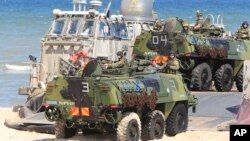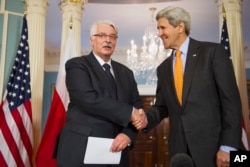Poland's foreign minister on Wednesday urged NATO to get over its reluctance to deploy troops along its eastern flank, to deter what he says is Russian aggression.
Russia's involvement in Ukraine and its seizure of Crimea nearly two years ago have made other countries along and close to Russian borders feel less secure, including Poland, Slovakia, Romania and the Baltic nations — home to a large number of Russian speakers.
Witold Waszczykowski said he disagrees with many of his fellow NATO ministers that the "idea of reassurances from a distance" is the best way to smooth over this insecurity stirred up by Russia.
For some allies, the presence of troops is considered to be confrontational toward Russia, Waszczykowski told VOA on Wednesday, while in Washington to meet with Secretary of State John Kerry.
“We cannot accept this philosophy,” Waszczykowski said. “We are saying that a lack of presence created a feeling of weakness and may create a provocation from the Russian side."
He said the Kremlin needs a strong signal from NATO.
"Presence is a token of determination to fight, to defend — and this will discourage Russia from any kind of aggressive moves toward eastern and central countries," Waszczykowski said.
NATO meeting
Jens Stoltenberg, NATO's secretary general, said Wednesday in Brussels before a two-day NATO defense ministers meeting that the alliance's increased “forward presence” in Eastern Europe sends a "clear signal" to any would-be aggressor.
“NATO will respond as one to any aggression against any ally,” he said, with a clear reference to Russia.
Russia reaction
However, Russia considers expansion by NATO to be an offensive move by a Western military alliance and a threat to its national security.
According to Reuters, Russian Foreign Ministry spokeswoman Maria Zakharova said Wednesday that NATO's military buildup on its eastern flank, the biggest in Europe since the Cold War, was a destabilizing factor designed to contain Russia.
Moscow has reacted by building up its defenses and forces close to NATO's borders, and increasing military exercises and drills.
U.S. response
Kerry said Wednesday that Poland and the U.S. are determined to make it clear to any country thinking of what he calls "destabilizing activities" that the NATO allies stand strongly together to respect the sovereignty of other nations and the integrity of international borders.
Poland will host a NATO summit in July, where Waszczykowski said he hopes the ministers will have answers to such threats as Islamic State, instability in Libya and North Africa, and the ongoing conflict in Ukraine.
Some material for this report came from Reuters.
WATCH: Poland's Foreign Minister Talks About Deploying Troops







